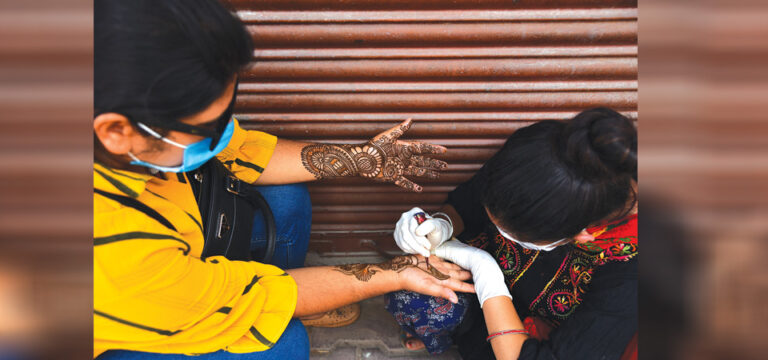
The holy month of Shrawan begins from Friday. The whole month is exclusively dedicated to Lord Shiva.
It is believed that the positive vibes flowing from Lord Shiva make the environment pure with his divine presence in the atmosphere.
In the month of Shrawan, devotees worship Lord Shiva and his consort Goddess Parvati. They observe fast every Monday with a belief that Lord Shiva will bestow His blessings on them and grant them peace and prosperity.
During this pious month, many people, Hindus in particular, do not eat non-veg foods and even avoid onion and garlic as much as possible as these foods are considered impure in the time of religious rites.
Along with the religious beliefs, fashion also adds to the brightness in the atmosphere in this month.
As the month begins, women start putting mehendi on their hands and wear red, green and yellow bangles in their wrists with saari and kurtha of matching colour, especially green, red and yellow.
Women and girls dazzle the environment with the colourful attires along with the stylish accessories. Unfortunately, like the previous year, this year too, there will be a big void in the month of Shrawan because of the second wave of COVID-19.
Temples, shrines and other religious places have remained closed since April 29 considering the risk of coronavirus.
Mira Dahal from Chabahil, Kathmandu said that for the past 16 months regular lifestyle has been confined within the periphery of house and as everything has been stalled, various cultural events and festivals have been directly affected.
She said that she has been fasting regularly in Sharwan for the past seven years and she always would visit Shiva temple every Monday in the month, but she is worried now because she won’t be able to go to the temple because of closure of the temples.
Like Mira, many other devotees are upset because they cannot visit the temple even during the holy month.
According to Hindu Sanatan and Buddhist culture as well as in various religious texts including the Veda, Upanishad and other religious scriptures, worshiping the nature has been given importance and in the
month of Shrawan Lord Shiva himself remains in the nature, said Dr. Chintamani Yogi, Founder/ Principal of Hindu Vidya Peeth Nepal.
Emphasising the significance of Shrawan, he said the month is associated with nature in particular with water element as the river Ganga flows from Lord Shiva’s hair too and Lord Shiva is the God of nature.
Worshiping nature has evolved as a culture and is directly associated with the utility of human life as the five elements of nature — water, earth, air, fire and sun — are an integral part of human beings, Dr. Yogi said and added that the month of Shrawan is also linked with the churning of the cosmic ocean (Samundra Manthan).
While the gods (Virtue) and demons (Vice) churned the sea to receive ‘nectar of immortality’ (elixir), venom emerged from the ocean and before it destroyed the universe Lord Shiva drank all the venom and retained the poison in his throat to save the universe from its negative effect.
Lord Shiva grieved a lot due to the poison in his throat and to get relief from the pain, he thrust his Trishul (holy Trident) into a mountain known as ‘Gosaikunda’ to extract water and stayed there and relieved his stinging throat. Therefore, the devotees offer water (Ganga Jal) to relieve the burning pain of Shiva with gratitude.
Dr. Yogi said that according to ‘Skanda Purana’ Shrawan is the favourite month of Shiva and Lord Shiva said that if any one worships Him during this month, He would be happy and bless them with internal peace and prosperity.
Astrologer Suresh Raj Giri said that from the first day of the month, the Sun God enters Cancer from Gemini and it would remain in the Cancer Horoscope throughout the month.
From this month, the Sun would move southward for the next six months until the Nepali month of Magh and all the important festivals including Dashain and Tihar are celebrated when the Sun moves southward, Giri added.
As per astrology and scientifically too, this month is the month of greenery as it is also the season of rain and a great time to cultivate grains, said astrologer Giri.
In this celestial month, the devotees also go on Bol Bam pilgrimage to collect holy water with bare feet and offer it to Shivalaya with the belief of peace and prosperity but this year the holy journey is likely to be hampered by the pandemic.
Source : TRN,






